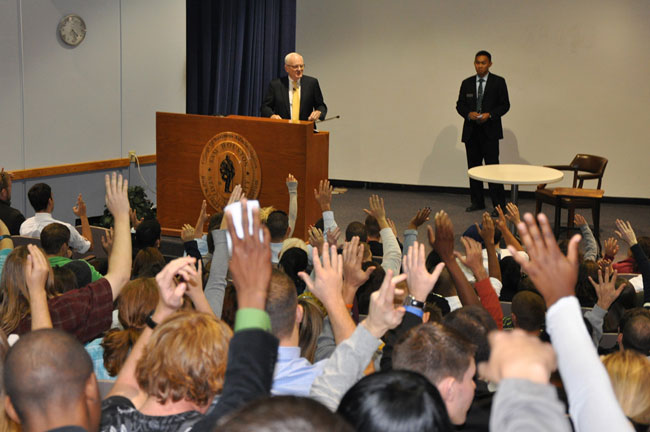Students Test Ethics In Espionage At CIA Seminar
Nov. 21, 2011
SHSU Media Contact: Beth Kuhles

Professor Jim Olson, a senior lecturer at Texas A & M and a former CIA officer, polled Sam Houston State University students about ethical issues in espionage, using the same challenges the U.S. government is facing in gathering intelligence across the globe.
Olson, author of Fair Play: The Moral Dilemmas of Spying, was the final speaker in the "Speaking of Ethics" series presented by the SHSU Junior Fellows and the College of Business Administration. The series, which featured business and government leaders, is the brainchild of business professor John Newbold and is designed to find innovative ways to motive students to think about ethical decision-making.
“We will be hit again,” said Olson, who teaches intelligence, national security and crisis management at Texas A & M’s Bush School of Government and Public Service. “We will be hit within our borders, it will be a mass destruction, and it will be horrific. This is a timely and very important topic, the global war on terrorism and the ethical issues of fighting that war. There is a national debate on the proper role of intelligence. We will win or lose based on how good our intelligence is.”
Olson asked the packed audience of 400 to weigh in on several scenarios on CIA operations that address terroristic threats against the U.S.
“Are these the kinds of actions I want my government to engage in to protect against a terrorist attack,” asked Olson. “These are all real situations, although the names and countries have been changed.”
Among the results from the SHSU audience were:
- 98 percent support renditions, the CIA -backed global abduction and internment operation of suspected terrorists
- 80 percent support targeted killing of suspected terrorists, even with collateral damage.
- 100 percent support the use of drugs to interrogate suspected terrorists
- 90 percent support waterboarding in the interrogation of suspected terrorists
- 99 percent approve of CIA agents posing as academicians to collect intelligence. For other professions, the support was 90 percent for posing as journalists, 20 percent for humanitarian aid workers, and 5 percent for missionaries/clergy.
- 95 percent support the use of seduction to gain intelligence information
- 60 percent support the use of blackmail against a foreign homosexual to gain information.
- 70 percent support the hiring of a prostitute for a foreign source to gain information
- 3 percent approve of a foreign informant participating in a car bombing to pass a “loyalty test” to gain access to a terrorist organization.
Olson and his wife Meredith served in the CIA for 25 years, where he rose to the position of chief of counterintelligence. The couple worked in such countries as Russia, Mexico and Austria. He speaks four languages, French, Russian, German, and Spanish.
“We were spies for 25 years, “ Olson said. “I believe that our country must have the very best intelligence in the world to protect our interests and protect our citizens.”
After graduating from the University of Iowa and serving on guided missile destroyers and frigates in the U.S. Navy, Olson returned to his alma mater for his law degree with dreams of becoming an attorney in a county seat in the state. Instead, he was recruited by the CIA in his last year of law school in a clandestine meeting that began with a cryptic telephone call to set up a meeting in Des Moines for a career opportunity to serve his country “in a different way.”
He later was flown to Washington under the guise of interviewing for an attorney position with the U.S. Department of Commerce. Instead, he was whisked away to a safe house in Virginia, where he was subject to a battery of tests that included aptitude, foreign language, psychological and polygraph exams.
After two years of paramilitary training at “The Farm” in Virginia, which included instructions in hand to hand combat, explosives, jumping out of an airplane and how to kill people with bare hands as well as the operation of ingenious weapons, he was sent on his first foreign assignment. He and his wife often performed different assignments and had dozens of false identification packages in their apartment hidden in furniture designed by the CIA.
They didn’t tell their children about their clandestine service until their eldest son was informed at 16 when the family received a credible death threat from an Iranian terrorist.
During his service, Olson gathered intelligence on many organizations, including the Soviet KGB, Chinese, Cubans and Iranians as well as narcotics rings and organized crime. In many countries, they faced years in prison, or even death, if caught in their task.
Olson urged students to be part of the debate on ethics in espionage.
“Good, sincere, educated and patriot Americans will disagree on these difficult issues,” he said. “We have an important decision to make. We have not created clear guideline. We need a good, thoughtful debate on the intelligence rules against terrorism and what kind of country are we are going to be.”
- END -
This page maintained by SHSU's Communications Office
Assistant Director: Julia May
Writer: Jennifer Gauntt
Located in the 115 Administration Building
Telephone: 936.294.1836; Fax: 936.294.1834
Please send comments, corrections, news tips to Today@Sam.edu.

 SamWeb
SamWeb My Sam
My Sam E-mail
E-mail

